KSEEB 8th English The Emperor’s New Clothes Lesson Notes Summary Questions and Answers
ILA. Your teacher reads a passage. Listen to it. Then answer these questions.
Question 1.
Why did the king feel proud of himself?
Answer:
King was very handsome. So he felt proud of himself.
Question 2.
Who felt angry with the king? Why?
Answer:
Gods in the heavens felt angry with the king. Once King bragged to his ministers, that he was more attractive than the Gods, so they felt angry with the king.
Question 3.
How did the tree come to know about the king’s horns?
Answer:
Due to God’s curse the king woke up with horns on his head. He ordered his ministers to get him a barber. The barber came and dressed up his head hiding the horns. The king threatened him not to tell the matter to anybody. He promised but could not keep the secret. He came to a tree near the palace and uttered “The king has two horns on his head”. Thus, the tree came to know about the king’s horns.
![]()
Question 4.
The Ministers praised the king. Which phrase is to mean praised. Interact with teacher.
Answer:
The phrase ‘compliments’ is used to mean ‘praised’.
IRA. Observe the following pictures carefully. What expressions each picture indicates? The expressions are given in the box. Two examples are given.
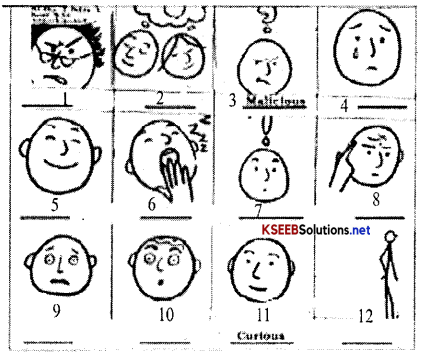
Answer:
- Angry
- Loving
- malicious
- sad/hurt
- happy
- sleepy/tired
- puzzled
- thoughtful
- dismayed
- frightened
- curious
- determined
Textbook Questions and Answers
I. Some statements are given below. Some are true and some are false. Tick off ‘T’ or ‘F’ before them. Also indicate the scene number in your answer is True. Two examples are done for you.
Question 1.
I want tailors who will make me magic clothes. T[S – 1]
Answer:
-T(S-I)
Question 2.
We require a large quantity of the finest silk and the purest gold thread. T [S – 1]
Answer:
– T(S – I)
Question 3.
I shall wear the new clothes in the coronation that I am expected to lead. [S-]
Answer:
-F
Question 4.
Only the gentlemen who are fit for their jobs can see the clothes. [S- ]
Answer:
-F
![]()
Question 5.
I must send my special assistant to see what really is happening here. [S-]
Answer:
– T(S – II)
Question 6.
The courtiers showed great surprise to see the Emperor. [S-]
Answer:
– T(S – III)
Question 7.
When the Emperor reached the balcony, there was pin-drop silence.
Answer:
– T(S – III)
II. Some important events in the play are given in a jumbled order. Put them in the order in which they are in the text.
1. The Emperor wears the new clothes and walks towards the balcony.
2. The Chief Adviser visits the looms to inspect the weaving.
3. The Special Assistant pays a visit to see how the weavers are preparing the new clothes.
4. The Emperor wants a different set of clothes.
5. He orders to find a new tailor to stitch his clothes.
6. The Emperor is fond of wearing new clothes.
7. The two tailors visit the palace.
8. A little child cries out that the Emperor has no clothes on and he is as naked as a baby.
Answer:
6, 4, 5, 7, 2, 3, 1, 8.
III. Four alternatives are given below each question. /Incomplete statement. Choose the most appropriate one.
Question 1.
The Emperor was fond of ……………….
(a) hunting the wild animals
(b) attending meetings
(c) wearing new clothes
(d) weaving new clothes
Answer:
(c) wearing new clothes
Question 2.
The tailors who came to the Emperor’s palace claimed that they were:
(a) great tailors
(b) ordinary tailors
(c) special tailors
(d) magic tailors
Answer:
(d) magic tailors
![]()
Question 3.
The weavers told the Emperor that they required
(a) the finest silk and the purest gold thread.
(b) the finest cotton and silver thread.
(c) the costliest diamond and muslin cloth.
(d) gems and copper thread.
Answer:
(a) the finest silk and the purest gold thread.
Question 4.
According to the weavers, the clothes made by them could not be seen by
(a) gentlemen fit for their jobs.
(b) fools unfit for their jobs.
(c) wise men fit for their jobs.
(d) people fit for wearing them.
Answer:
(b) fools unfit for their jobs.
Question 5.
Who cried out with laughter that the king was as naked as a baby?
(a) the Chief Adviser
(b) the first weaver
(c) a child
(d) the special assistant.
Answer:
(c) a child
IV. Read and discuss your responses with your partner. Then write.
Question 1.
Why was the Emperor not able to give much time to the business of his kingdom?
Answer:
Emperor spent many hours every day in his dressing room trying out new clothes. Hence he was not table to give much time to the business of his kingdom.
Question 2.
Why did the Emperor want a new set of clothes every day?
Answer:
Emperor was fond of wearing new clothes. To him, new clothes meant more than anything else in the world. So he wanted a new set of clothes everyday.
Question 3.
What did the Chief Adviser tell the Emperor about the two weavers?
Answer:
Chief Advisor told the emperor that the weavers had found a secret way of weaving the finest silk cloth and making the most beautiful clothes from the cloth that they wove. They claimed to be magic tailors.
Question 4.
What did the two weavers say about the magic way of making beautiful silk cloth?
Answer:
The two weavers said that the beautiful silk cloth would be finely woven. The cloth would have so many rich colours and also such attractive patterns that only a great Emperor like him could wear clothes made from such a cloth.
Question 5.
How would the clothes made of the magic cloth be different from the ordinary clothes that people wear?
Answer:
Only wise men could see what one had worn but fools would not be able to see the clothes at all. This was the speciality of their cloth.
![]()
Question 6.
Why did the Emperor think that the weavers had given him an excellent idea?
Answer:
Weavers told the Emperor that those who were clever and fit for their jobs could see what he had worn. Those who were foolish and unfit for their work would not see anything. So by this, he could judge his minister and officers who are fit to manage the affairs of his kingdom and who are unfit. So he thought, that the weavers had given him an excellent idea.
Question 7.
What conditions did the weavers lay down for starting the work?
Answer:
Weavers laid down a condition for starting the work that they required a large quantity of the finest silk, the purest gold thread, and several jewels.
Question 8.
How did the two weavers start their work on the two looms?
Answer:
The two weavers started their work on the two looms pretending to weave. They had put away in their bags all the fine silk, the gold thread and jewels which were given to them for making the new clothes.
Question 9.
Why was the Chief Adviser greatly surprised when he first saw them working?
Answer:
The Chief advisor entered the room to inspect the weavers work. They seemed to be working very hard. But no cloth could be seen on the looms. So he was greatly surprised when he first saw them working.
Question 10.
How did the weavers try to confuse the Chief Adviser?
Answer:
They pointed to the loom and pretended to handle the cloth they were supposed to be wearing. They told him about the pattern, design, circles, flowing lines and colours. But chief advisor could not see anything. By describing cloth in this manner, they tried to confuse the Chief Advisor.
Question 11.
What made the Chief Adviser feel worried about his own fitness for the post he was holding?
Answer:
The weavers had said that only wise men could see the clothes that they make. Those who could not see them were fools or unfit for their jobs. As he could not see anything on their looms, the Chief adviser was worried about his own fitness for the post he was holding.
![]()
Question 12.
What was the terrible experience of the adviser’s special assistant?
Answer:
Special Assistant entered the room and was surprised when he saw the two weavers working on the two looms with no trace of any cloth or thread on it. But they showed and told him about the beautiful circles, flowing lines, colours patterns and designing of the cloth. He simply nodded for whatever they said. Hence, he considered his experience to be terrible.
Question 13.
How did the two weavers pretend to make the Emperor’s new clothes and help him to wear them?
Answer:
Weavers came forward to the emperor, pretending to hold the invisible clothes in their hands and bowing to him. They said to emperor that they were his coat and trousers which he would wear in the procession. They requested the Emperor to come to the dressing room so that they could help him to wear the new clothes. Like this, the weavers pretended to make the Emperor’s new clothes and help him wear them.
Question 14.
Why did the Chief Adviser request the Emperor to show himself on the balcony?
Answer:
Chief adviser requested the Emperor to show himself on the balcony because the people were eagerly waiting outside to see him in his new clothes. It would please them very much if he showed himself to them before the procession set out.
Question 15.
What was the Emperor’s reply to his request?
Answer:
Emperor replied that he had just put on the most wonderful clothes those tailors had made for him. He promised to come to the balcony as soon as he was ready.
Question 16.
How did the courtiers behave when the Emperor walked towards the balcony almost naked?
Answer:
The courtiers showed great surprise to see the Emperor having little clothes on his body. But no one said anything because they had been told that only wise men would be able to see the emperors new clothes but fools would not see them.
Question 17.
What happened when the Emperor reached the balcony?
Answer:
Loud cheers were heard from the crowd standing on the road outside when the Emperor reached the balcony. The cheering stopped all of a sudden and there was pin-drop silence. Then, a little child cried out laughing “Look Daddy, the Emperor has no clothes on at all. Has the . king become very poor? Doesn’t he have money to buy clothes?”.
![]()
V. Answer each of the following question in a paragraph.
Question 1.
The Emperor has been described as proud and foolish. But he has another serious weakness which is shown in his behaviour towards his Chief Adviser. Write a paragraph describing the Emperor’s character.
Answer:
The emperor was not only a proud and foolish person but also weak in judging others. He trusted and believed others blindly. The Chief Adviser told him that two weavers who had come from distant place were waiting outside to visit him. He said that they claimed to be magic tailors. Without thinking, king asked Chief advisor to bring them to the court.
The weavers visited the emperor and said that they had discovered a magic way of making the most beautiful silk cloth from which they could make beautiful clothes for Emperor. They requested the emperor to provide them with the finest silk, pure gold thread and several jewels. The emperor promised to provide them all that was required.
Again they told that when he wore a suit made out of that cloth, only wise men can could see that he was wearing but fools would not be able to see it at all. The king believed them blindly.
After two days, weavers came to the Emperor pretending to hold the invisible clothes in their hands and told the Emperor that those were his coat and trousers. He believed them and nodded his head. Really there were no clothes in their hands. Weavers pretended to help the Emperor to wear new clothes in the dressing room. He came to the balcony to show his new beautiful dress to people. But he was almost naked. The weavers had tricked the Emperor and made a fool of him.
Emperor did not trust the Chief adviser in the beginning. He rejected the clothes specially made for him for special days. But the same emperor believed and trusted Chief adviser and weavers blindly though they made a fool of him. He had a mixed character.
Question 2.
Imagine you are the child who laughed at the king at the end of the story. Narrate the scene to your friends, and write the narration.
Answer:
Dear friend, my father told me about our Emperor. Our Emperor is fond of wearing new clothes every day. Three days back, two magic tailors came to the court and made new clothes to the Emperor. People were eager to see the beautiful magic clothes of Emperor.
The Emperor should appear on the balcony with the new clothes before the procession. I also went there with my father. Many people had gathered there. We were waiting for the Emperor’s arrival in the balcony. There were loud cheers from the crowd standing on either side of the road.
When the Emperor came out to the balcony, cheers stopped all of a sudden and there was pin-drop silence. I was surprised and could not believe my eyes.
The Emperor was not wearing any magic dress. I thought that the Emperor might have become poor. I blurted out to my father that the Emperor was not wearing anything and that maybe he has become poor.
![]()
Question 3.
The weavers tricked the Emperor, Do you think what they did was right?
Answer:
Yes, I think that weavers tricking the emperor was right.
Emperor was very fond by wearing new clothes. It is acceptable. But he spent so many hours every day in his dressing room trying out new clothes that he had very little time to attend to the affairs of his kingdom. He had forgotten his duties and responsibility as a emperor he did not believe his trusted chief advisor though he provide him new clothes specially made for him.
He believed unknown weavers blindly. He should have judged the weavers when they told him about their invisible magic clothes. Foolishness, on the part of the Emperor, allowed the weavers to trick him. So l agree that the weavers taught a good lesson to the Emperor.
The Emperor’s New Clothes Lesson Vocabulary in English
VI. Look at the following opposites.
Question 1.
useful × ______________
Answer:
useless
Question 2.
powerful × ______________
Answer:
powerless
Question 3.
hopeful × ______________
Answer:
hopeless
Question 4.
helpful × ______________
Answer:
helpless
![]()
Question 5.
worthy × ______________
Answer:
worthless
Question 6.
Careful × ______________
Answer:
careless
Note: The suffix – less mean ‘without’ as in – noiseless [without noise]: purposeless [withoug purpose].
Now make as many phrases as possible and use them in sentences of your own. one example is done for you.
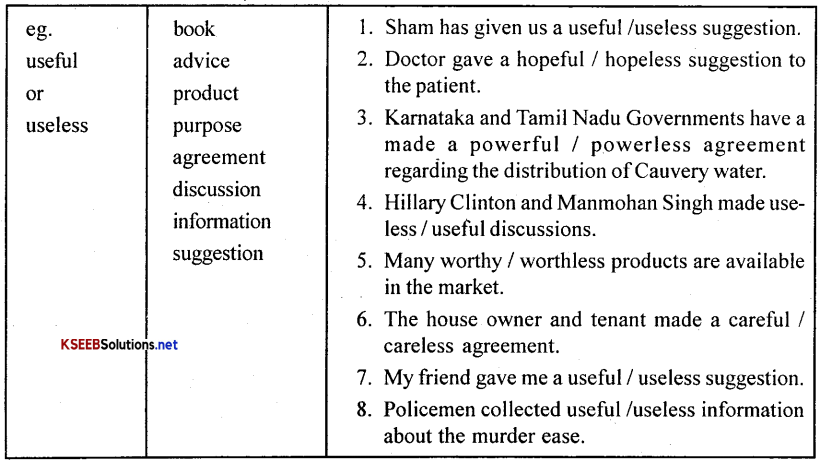
V2. Read the following phrases given in the web diagram.
From the web-diagram frame phrases like set up… First, match them with their meanings given in brackets. Then fill in the blanks.
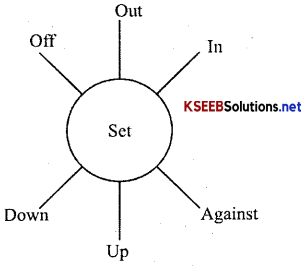
[Start on a journey, to be put down in writing, be opposed to, trigger, begin, established]
![]()
Use the correct farm of the phrasal verbs given in the web diagram and fill in the blanks Appropriately.
Question 1.
Why don’t you ______________ your ideas on paper?
Answer:
set down
Question 2.
Ravi and Raju have ______________ on a journey round the world.
Answer:
set out
Question 3.
How long will you take to ______________ this machine?
Answer:
set up
Question 4.
Suma ______________ herself going to University.
Answer:
set against
Question 5.
If we all ______________ we can finish the cleaning in an hour.
Answer:
set off
Question 6.
I have to buy some woollens before the cold weather ______________ .
Answer:
sets in
![]()
V3. Read the sentences and match them with their meanings.
| 1. take a day off, Kavya | a. angry, unfriendly |
| 2. Mysore is still five miles off | b. starting on a journey |
| 3. Asha is off to Mangaluru tomorrow | c. away, distant in time. |
| 4. Shoes are on sale with 20% off. | d. away, distant in space. |
| 5. The bullet went off the target. | e. away from work or duty: |
| 6. The holidays are not so far off now. | f. reduced in price, cheaper. |
| 7. Veena was a bit off with me this morning. | g. away from the aim. |
Answer:
- – e
- – d
- – b
- – f
- – g
- – c
- – a
V4. Read the table and study the example. Different forms of the words are given below. Different forms of words

Now frame sentences using each of these word forms
e.g. The Scientist was sucessful in his efforts.
Answer:
Success: The race ended in the success of the Mysore Maharaja’s horse.
I haven’t had much success in my application for jobs.
1. Succeed: If at first you don’t succeed, try and try again.
2. Succeeded: I succeeded in climbing Mount Everest.
When the king died, his eldest run succeeded him.
The British succeeded in capturing Srirangapatana.
3. Successful: My father is a successful businessman.
4. Successfully: I completed my High School education successfully.
5. Successor: The successors of Aurangzeb were weak and inefficient.
6. Unsuccessful: Alexander made an unsuccessful attempt to fulfill his ambition to conquor the whole world.
7. Unsuccessfully: Testing of a missile by the scientist failed unsuccessfully.
8. Succeeding: Eldest son of the ruler was succeeding to the throne.
![]()
V5. Fill in the blanks with the correct form of the words in brackets. One example has been given for you. Write different forms of words and frame one example for each form of word.
Question 1.
The dog was ………………… [name] Tommy.
Answer:
Named
Name: My friend’s name is Bhushan.
Nameless: We have a beautiful cow.
It is nameless.
Question 2.
I’m ………………… [hope] that you’ll succeed this time.
Answer:
hopeful
hope: I hope to win ₹ one crore in Kannadada Kotyadipati competition.
hopeless: He is hopeless at maths.
hopelessly: I saw a hopelessly ill patient.
Question 3.
His love was only a ………………… [pretend] to cheat me.
Answer:
Pretention
Pretend: My friend pretended that he was not at home when we rang the bell.
Question 4.
The child was ………………… [health] and good-looking.
Answer:
healthy
health: Doctors checkup our health,
healthful: Ooty is a healthful hill station.
Healthiness: We should feel proud of , the healthiness of our grand parents.
Question 5.
It is our duty to ………………… [service] our parents in their old age.
Answer:
Serve:
Service: He had made some very good services to the nation.
Serviceable: The tyres are worn out but still serviceable.
Question 6.
Parents should ………………… [education] their children to behave well.
Answer:
Educate
Education: We have to get a good education.
Educational: There are many good Educational Institutions in Bengaluru.
Educationally: In many villages, people are still educationally backward.
![]()
V6. Fill in the blanks using the appropriate form of words given in brackets.
We had a ………………. [wonder] holiday at Ooty last summer. The weather was ……………… [cool] most of the time. We had ……………… [please] showers almost daily. The food was ……………… [delicious], but father thought it was rather ……………… [spice]. The people were ……………… [friend] and the scenery was extremely ……………… [attract]! We took a lot of ……………… [beauty] photographs of the hills and valleys. One night we watched a show of folk dance and music. Oh, it was so ……………… (entertain)! On our last day, we went to the State Emporium and bought some ……………… [art] things made out of wood.
Answer:
- wonderful
- cool
- pleasant
- delicious
- spicy
- friendly
- attractive
- beautiful
- entertaining
- art
V7. Rewrite the following sentences after making necessary corrections.
- The News are very good.
- There are 26 letters of the alphabets in English.
- Please give me some informations.
- I have bought some furnitures last week.
- Politics are the last resort of scoundrels.
- There are more sceneries in the paintings.
Answer:
- The News is very good.
- There are 26 letters in the English alphabet.
- Please give me some information.
- I have bought some furniture last week.
- Politics is the last resort of scoundrels.
- There are many scenery in the paintings.
![]()
A. Listen and Speak
B. Spoken English
C. Reading
Task 1. Read the following passage and answer the questions.
Man – The enemy
Man is an enemy of many animals.
Baby seals are clubbed to death for their skins. Crocodiles are tracked down and their skins are used for hand bags and shoes. Elephants are destroyed for their ivory which is used for Jewellery.
Whales are hunted for their oil.
The whole species is being endangered to satisfy man’s love for fashion.
Questions: Make a list of the animals mentioned above and for what use they are killed.
Animals Use
Elephant Jewellery
_____________ _____________
_____________ _____________
_____________ _____________
The above passage deals with man as an enemy of animals.
Answer:
| animals | use |
| elephant | jewellery |
| Baby seals | Skins |
| crocodiles | Skin-hand bags and shoes |
| whales | oil |
Task 2. Read the passage and fill in the table with facts about cats and dogs. One is done for you.
Inferential comprehension
Domestic cats belong to the family of tigers, whereas domestic dogs belong to the family of wolves. Cats are very familiar with the area they live in. It helps them to find the best place to hunt. Hence a domestic cat remains faithful to its home area and it hunts alone. Wild dogs hunt in groups: share their food and co-operate with one another. Hence domestic dogs are faithful to their masters. Their body language too is unique in many ways.
Cats arch their back and try to look large when they are angry, whereas dogs pull their lips back and show their teeth when they are angry. Cats and dogs do have some special skills. A cat can fall from a significant height but still survive without much injury. A dog guards the property as it is faithful to its master. It can sense any smell in to time.

Answer:
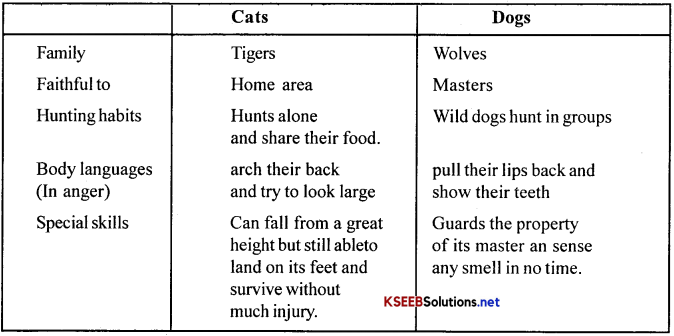
![]()
D. Grammar
Task 1. Read the conversation between Alladin and a stranger.
Stranger: Are you Mustafa’s son?
Alladin: Yes Sir, I am, but my father is dead.
Strange: Don’t worry, my son! This is indeed a sad news. I am your father’s brother. Go and tell your mother. (Now Alladin went to his mother)
Alladin: Mother, there is a gentleman at the door. He says he is my uncle. Should I bring him in? Fill in the blanks in the paragraph given below using the clues given:
Note: The above conversation changed into indirect speech.
Alladin met a strange who asked him 1 Alladin told him 2 dead. The stranger consoled him saying 3 and told him 4 He further informed him 5 brother and asked him 6 Alladin went and told his mother that there was a stranger at the door who said he was his uncle He further asked her 7
Clues
- that he was, but his father was
- not to worry
- if he should bring the stranger in
- to go and tell that to his mother
- if he was Mustafa’s son
- that he was his father’s
- that it was indeed a sad news.
Note: (The two ways of expressing.)
Answer:
- if he was Mustafa’s son.
- that he was, but his father was
- not to worry
- that it was indeed a sad news.
- that he was his father’s
- to go and tell that to his mother
- if he should bring the stranger in
Task 2. Now express the following sentences in the reported speech:
Question 1.
Kiran said to Reshma, “I’m enjoying my new job.”
Answer:
Kiran told Reshma that he was enjoying his new job.
Question 2.
“Renu has invited us to the party,” said Reshma.
Answer:
Reshma said that Renu had invited them to the party.
Question 3.
Kiran said, “We must attend the party. Let’s plan for it.”
Answer:
Kiran said that they must attend the party and further said that they had to plan for that.
Question 4.
Kiran’s father said, “You must visit your grandmother more often”.
Answer:
Kiran’s father asked him to visit his ‘ grandmother more often.
![]()
Question 5.
Reshma said, “We are planning to visit her coming Sunday”.
Answer:
Reshma said that they were planning to l visit her the next Sunday / coming Sunday.
Question 6.
“Last month you were busy. So you dropped the idea,” said Kiran’s k mother.
Answer:
Kiran’s mother reminded him that he was busy the previous month and so had dropped the idea at that time.
E. Writing
Punctuation.
Task 1. Look at the following sentences, and observe how the commas are used.
1. Sarojini Naidu, the Nightingale of India, was born in Hyderabad in 1879.
2. Indira Priyadarshini, daughter of Jawaharlal Nehru, became as famous as her father.
Note: A comma is used in writing to denote a pause.
Task 2. Insert commas wherever necessary:
Question 1.
Sir John Smith the Vice Chancellor arrived just now.
Answer:
Sir John Smith, the Vice Chanceller, arrived just now.
Question 2.
As the teacher entered all the students stood up.
Answer:
As the teacher entered, all the students stood up.
Question 3.
“John when will you come?” said Prema.
Answer:
“John, when will you come?”, said Prema.
Question 4.
Not knowing whom to address he kept silent.
Answer:
Not knowing whom to address, he kept silent.
Question 5.
If you do not know the answer ask the teacher.
Answer:
If you do not know the answer, ask the teacher.
![]()
Task 3. Read the following sentences. Observe the use of apostrophe (‘).
1. We celebrate Children’s Day on November 14th every year.
2. Teachers’ Day is celebrated on September 5th every year.
3. This is men’s wear and that is women’s wear.
4. “The Emperor’s New Clothes” is a play.
5. A Nation’s Strength is a meaningful poem.
Note: Apostrophe (’) is used to show possession.
Usually they are used with living beings.
Task 4. Use apostrophe (’) wherever necessary in the following paragraph.
Aristotle was born in Stagira, a Greek outpost on the Macedonian coast. His father was a doctor in the court of Philip II of Macedon. When Aristotle was about 17, he left for Athens where he became a pupil of Plato. He stayed in Platos Academy in Athens for 20 years, first as a student and later as a teacher. Then he was invited back to Macedon to tutor Alexander, Philips son.
Aristotles enthusiasm for wisdom and for free expression of ideas greatly influenced the young prince, and clearly played a role in eventually making him Alexander the Great.
Interestingly, Socrates disciple was Plato, Platos disciple was Aristotle, and Aristotles disciple was Alexander the Great.
Answer:
Aristotle was born in Stagira, a Greek outpost on the Macedonian coast. His father was a doctor in the court of Philip II of Macedon. When Aristotle was about 17, he left for Athens where he became a pupil of Plato. He stayed in Plato’s Academy in Athens for 20 years, first as a student and later as a teacher. Then he was invited back to Macedon to tutor Alexander, Philip’s son.
Aristotle’s enthusiasm for wisdom and for free expression of ideas greatly influenced the young prince, and clearly played a role in eventually making him Alexander the Great.
Interestingly, Socrates’ disciple was Plato, Plato’s disciple was Aristotle, and Aristotle’s disciple Was Alexander the Great.
![]()
Suggested Reading:
Additional Questions with Answers
I. Each of the following statements has four choices for the answer. Choose the appropriate one.
Question 1.
The Emperor was spending most of his time.
(a) to attend to the affairs of his kingdom.
(b) to conquer other states.
(c) in his dressing room trying out new clothes.
(d) to go round the state.
Answer:
(c) in his dressing room trying out new clothes.
Question 2.
Emperor was fond of
(a) wearing old clothes
(b) Eating sweets
(c) listeming to stories
(d) wearing new clothes
Answer:
(d) wearing new clothes.
Question 3.
Emperor ordered the Chief adviser to.
(a) kill all the tailors
(b) Imprison all the tailors
(c) banish all the tailors
(d) bring all the tailors to the court
Answer:
(c) banish all the tailors.
Question 4.
The weavers came from :
(a) Village
(b) Town
(c) neighbouring kingdom
(d) a distant place
Answer:
(d) a distant place.
![]()
Question 5.
Weavers claimed to be :
(a) wonderful tailors
(b) magic tailors
(c) skilled tailors
(d) special tailors
Question 6.
Emperor wanted the new clothes to wear:
(a) during the festival
(b) in the procession
(c) to visit the people
(d) to go to neighouring state
Answer:
(b) in the procession
Question 7.
By wearing magic clothes the Emperor could judge:
(a) people
(b) weavers
(c) his minister and officers
(d) tailors
Answer:
(c) his minister and officers.
Question 8.
Chief advisor visited the looms:
(a) to give silk and gold thread
(b) to bring clothes
(c) to inspect the weaving
(d) to give suggestion to weavers.
Answer:
(c) to inspect the weaving.
Question 9.
Chief advisor doubted whether he was a fool because.
(a) weaver did not follow his advice
(b) he could not understand what weavers said
(c) he had not seen anything on the loom.
(d) weaves asked him for more silk and gold thread.
Answer:
(c) he had not seen anything on the loom
![]()
Question 10.
People were waiting outside because:
(a) to visit the Emperor.
(b) to say their problems to king.
(c) to see the Emperor in his new clothes.
(d) to honour him.
Answer:
(c) to see the Emperor in his new clothes.
Question 11.
When the Emperor reached the balcony, cheering stop all of a sudden and there was a pin drop silence because:
(a) Emperor ordered to imprison them
(b) Emperor had worn very beautiful clothes
(c) Emperor was almost naked
(d) they were afraid of the emperor.
Answer:
(c) Emperor was almost naked
Question 12.
Loud cheers were heard … the crowd standing the road: The correct prepositions is to be filled:
(a) on, in
(b) from, on
(c) by, along
(d) over, across
Answer:
(b) from, on
![]()
II. Read the following extracts and answer the questions that follow :
Question 1.
your majesty, these are the best that I could get for you today”
a. Who is the ‘I’
Answer:
‘I’ refers to Chief advisor.
b. Who is it said to?
Answer:
It is said to the Emperor.
c. What does ‘these’ refer?
Answer:
“These” refer to the clothes.
Question 2.
“Banish them all, send them one and all out of the country”
a. Who said this?
Answer:
The Emperor said this
b. Who was it said to?
Answer:
It was said to Chief adviser.
c. Who does ‘them’ refer?
Answer:
Them refer to the tailors.
d. What is the meaning of ‘banish’
Answer:
Banish means send one out of the country as punishment.
![]()
Question 3.
“We require a large quantity of the finest silk and the purest gold thread”
a. Who does ‘we’ refer?
Answer:
We refer to the weavers.
b. Who was it said to?
Answer:
It was said to the Emperor.
c. Why did they require silk and gold thread?
Answer:
They required silk and golden thread to weave cloth and make the clothes for the Emperor.
Question 4.
Only wise men can see what you are wearing, but fools will not be able to see it all.
a. Who said this?
Answer:
The first weaver said this.
b. Who does ‘you’ refer?
Answer:
‘you’ refers to the Emperor.
c. Why did they say?
Answer:
They wanted to trick the Emperor.
Question 5.
“And by wearing these clothes, you will be able to judge your minister and your officers very easily”.
a. Who said this?
Answer:
The second weaver said this.
b. Who does ‘you’ refer?
Answer:
‘You’ refers to the Emperor.
![]()
c. Why did he said so?
Answer:
He wanted the Emperor to believe the weavers, so that they could trick him.
Question 6.
“We were expecting you, step this way, step this way, if you please”
a. Who does ‘we’ refer?
Answer:
We refers to the weavers.
b. Who is ‘you’?
Answer:
‘You’ is the chief advisor
c. Why did the Chief advisor go there?
Answer:
He went their to inspect their weaving.
Question 7.
Good Heavens? What are these weavers doing? I don’t see any cloth anywhere.
a. Who is the ‘I’?
Answer:
T is the special Assistant.
b. What were they doing?
Answer:
They were pretending to weave the cloth.
c. Why did the special assistant go there?
Answer:
He went there to inspect the work of the weavers.
![]()
Question 8.
“Here, your majesty, are the coat and trousers, which you will wear in the procession”.
a. Who said this?
Answer:
First weaver said this.
b. Who was it said to?
Answer:
It was said to the Emperor.
c. Was he really holding the clothes?
Answer:
No, he was pretending to be holding the cloth.
Question 9.
“Your majesty, the people are waiting outside to see you in your new clothes”
a. Who said this?
Answer:
Chief advisor said this.
b. Who is ‘you’ here?
Answer:
‘You’ is the Emperor.
![]()
c. Why were the people waiting outside?
Answer:
To see the Emperor in his new clothes.
Question 10.
Look, look Daddy, the Emperor has no clothes on at all. Has the king became very poor?”
a. Who said this?
Answer:
A child in the crowd said this.
b. Who was it said to?
Answer:
It was said to his father.
c. Why did he say?
Answer:
He said that because the Emperor had worn very little clothes. King was almost naked.
III. Answer the following questions.
Question 1.
Why was the Emperor in an angry mood?
Answer:
The Emperor was in an angry mood because he considered all the clothes provided for him were useless. Not one of the suits could be worn by him.
Question 2.
What did he order the Chief advisor?
Answer:
He ordered the Chief advisor to banish all the tailors from his empire and to come to him only when he had found a new tailor.
Question 3.
What was the speciality of the two weavers?
Answer:
The two weavers claimed to have found a secret way of weaving the finest silk cloth and making the most beautiful clothes from the cloth that they wove. They claimed to be magic tailors.
Question 4.
Why did Chief advisor visit the looms?
Answer:
The Chief advisor visited the looms to inspect the weaving.
![]()
Question 5.
What did the weavers say to the Chief advisor about the colour of the cloth?
Answer:
They said that the clothes were in dark red and blue colours on the gold background.
Question 6.
Why did Chief advisor decide to send special assistant to weavers room?
Answer:
He sent the special assistant to see what really was happening with the weavers.
Question 7.
Why did Special Assistant pay a visit to the looms?
Answer:
He paid the visit to loom to see how the weavers were preparing the new clothes.
Question 8.
Do you think weavers really prepared any clothes?
Answer:
No. They had not prepared any clothes They were pretending to be weaving.
Question 9.
What do you think about the Emperor?
Answer:
Emperor was weak in judging others. He believed the weavers blindly. He nodded his head when the weavers pretending to hold the invisible clothes in their hand and discovered the beauty of the cloth. Really, there was no cloth in their hands. Emperor was a fool to believe them.
Question 10.
Why did the cheering of the crowd stop all of a sudden?
Answer:
The cheers from the crowd stopped and there was pin drop silence when the Emperor came to the balcony, because was almost naked.
IV. Fill in the blanks with the suitable prepositions:
Question 1.
Emperor was spending so many hours every day ………………………… his dressing room.
Answer:
in
Question 2.
The Emperor entered the Hall followed ………………………… the Chief Advisor.
Answer:
by
Question 3.
When the Emperor gets up ………………………… his chair and all the courtiers also stand up.
Answer:
from
Question 4.
The Emperor is seen coming ………………………… of the dressing room.
Answer:
out
Question 5.
The Emperor wears the new clothes and walks ………………………… the balcony.
Answer:
towards
![]()
V. Match the opposites: following with their
| 1. foolish | a. naked |
| 2. clothed | b. humble |
| 3. beautiful | e. small |
| 4. proud | d. ugly |
| 5. large | e. wise |
| f. big |
Answer:
1. – e
2. – a
3. – d
4. – b
5. – c
VI. Match the following with their meanings
| 1. banish | a. find out |
| 2. discover | b. like something |
| 3. pattern | c. improve |
| 4. fond of | d. send out |
| 5. Progress | e. design |
| f. colours |
Answer:
1. – d
2. – a
3. – e
4. – b
5.-c
Write the opposites (with suffix / prefix)
Question 1.
useful × ___________
Answer:
useless
Question 2.
worthy × ___________
Answer:
worthless
Question 3.
pure × ___________
Answer:
impure
Question 4.
fit × ___________
Answer:
unfit
Question 5.
expected × ___________
Answer:
unexpected
Question 6.
please × ___________
Answer:
displease
Question 7.
colourful × ___________
Answer:
colourless
Question 8.
visible × ___________
invisible.
![]()
The Emperor’s New Clothes Lesson Summary in English
This play is about a proud and foolish Emperor. He was very fond of wearing new clothes. He spent so many hours every day in his dressing room trying out new clothes, that he had very little time to attend to the affairs of his kingdom. Two weavers, visited the emperor and told him that they’d weave a magic cloth for him. But they really made fool of the Emperor.
Scene – I
One day the Emperor was in a very angry mood. He was dissatisfied with the new suits. He said to his chief advisor that not one of the suits could be worn by him. He ordered him to bring a tailor who
could make him a different set of clothes every day.
The chief advisor told the emperor that since the previous day, two weavers from a distant place were waiting outside the palace to see the Emperor. They had found a secret way of weaving the finest silk cloth and making the most beautiful clothes from the cloth that they weave. They claimed to be magic tailors. Emperor ordered the chief advisor to bring them.
They approached the Emperor and requested him to provide them a large quantity’ of the finest silk, the purest gold thread for weaving the cloth and several Jewels to sew on the new clothes. Emperor told them that his chief advisor would provide whatever they wanted. He wanted new clothes to wear in the procession that he was expected to lead two days later.
The weavers told the Emperor that they had discovered a magic way making the most beautiful silk cloth. First they said that when he wore a suit, fools would not be able to see that at all. By wearing those clothes emperor would be able to judge his ministers and officers easily. Only those who were clever and fit for their jobs will see what the Emperor wore.
Those who were foolish and unfit for their work would not see anything. Emperor was happy for he was not only about to get new dress but also able to judge his ministers and officers whether they were fit or unfit to manage the affairs of his kingdom.
Scene – II
The two weavers were working on the looms pretending to weave. They put away in their bags all the fine silk, the gold thread and the jewels which were given to them for making the new clothes. The chief advisor came there to find out how the weavers were getting on with their work.
They seem to working very hard. But he could not see anything on the looms. Weavers pointed to the loom and pretended to handle the cloth they were supposed to be weaving. They asked the chief advisor whether we liked the pattern like circles and flowing lines and colours like dark red and blue on the gold background.
They demanded more silk and gold thread to complete the work. Chief advisor could not see anything. He was puzzled and confused. He thought to himself whether he was fool and unfit for his post. But, he decided to send his special assistant to check what was happening there. After the chief advisor goes, the two weavers danced round at the success of their trick.
Scene – III
The special assistant entered the room to inspect their work. He too was surprised when he saw the two weavers working on the two looms with no trace of any cloth or thread on it. The weavers showed the cloth and told about the pattern and colours and that clothes will be ready the next day. The special assistant could not see anything and was confused. He went out and spoke to himself that whether he was a fool and unfit for the job. He could not understand anything.
Scene IV
The two weavers came in bowing to the Emperor, and pretending to hold the invisible clothes in their hands. They showed the coat, trousers and suits to the emperor. The emperor nodded his head. They requested the emperor to come to the dressing room so that they might help him to wear the new clothes. The emperor went in to the dressing room.
There was some noise made by the rustling of the clothes and the low voices of the two weavers were heard for some time. The chief advisor went near the dressing room and told the Emperor that people were waiting outside to see him in his new clothes. It would please them very much if he showed himself on the balcony before the procession started.
The Emperor is seen coming out of the dressing room almost naked and walked through the hall towards the balcony. The courtiers showed great surprise to see the emperor having little clothes on his body. But no one said anything because they had been told that only wise men will be able to see the emperor’s new clothes and fools and unfit people for their post would not see them.
People were gathered outside and cheering. When emperor reached balcony, the cheering stopped all of a sudden, and there was pin drop silence. Then a child in the crowd cried out laughing telling his father that the emperor had no clothes at all and asked whether the Emperor had become poor.
Really the emperor had not worn any dress. The weavers had made a fool of him.
![]()
The Emperor’s New Clothes Lesson Summary in Kannada
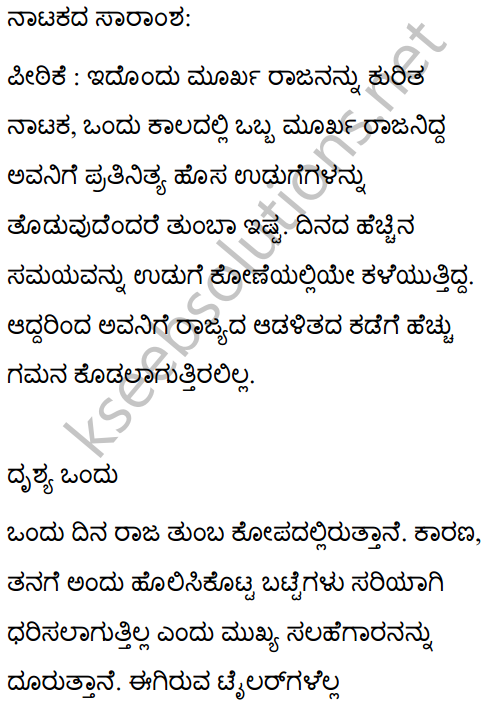
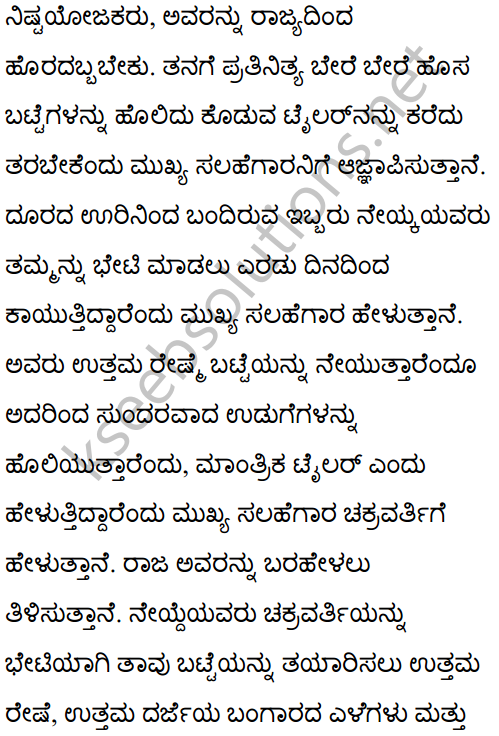
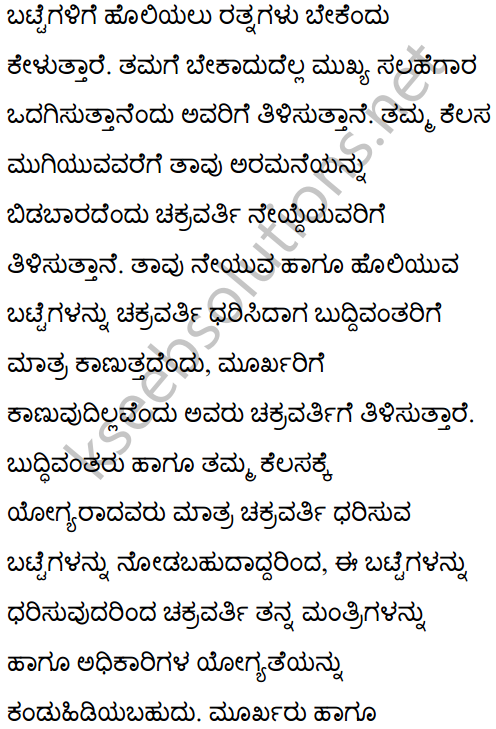
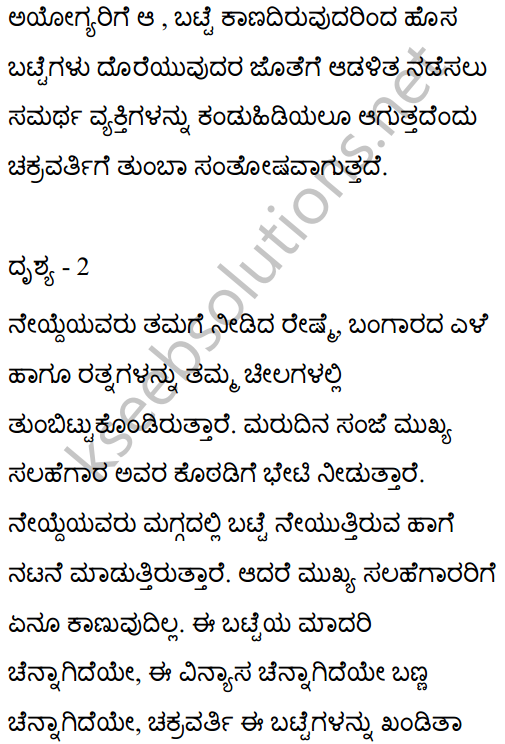
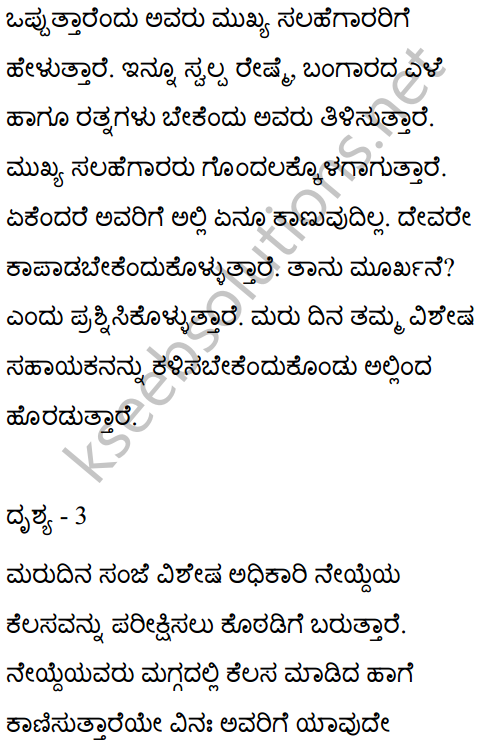
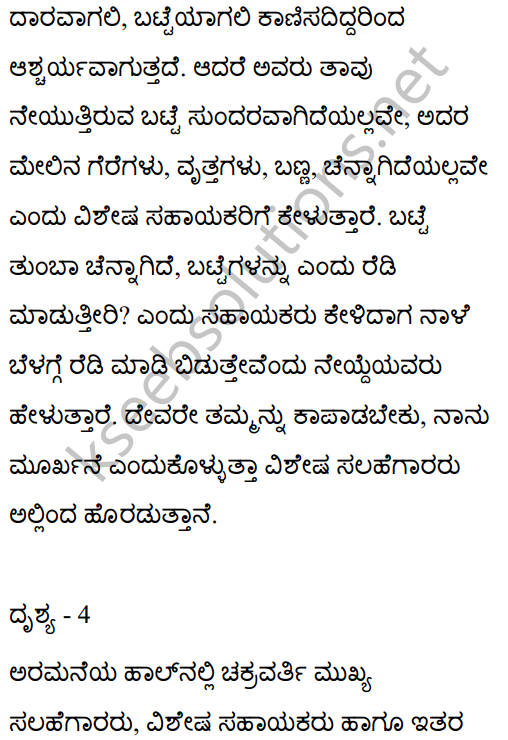
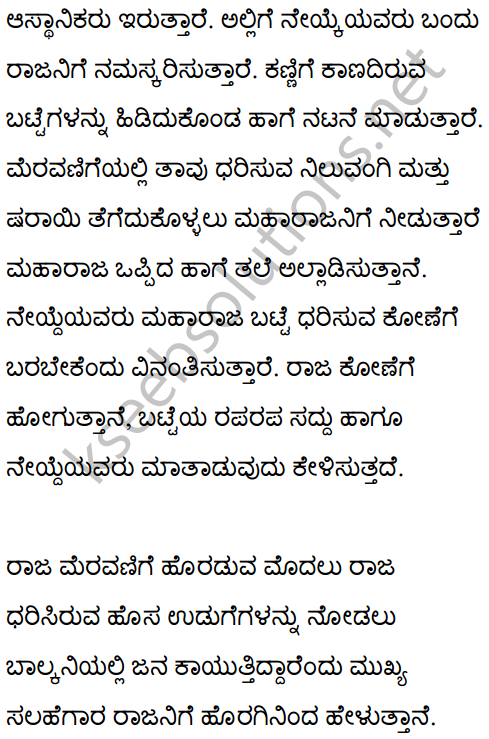
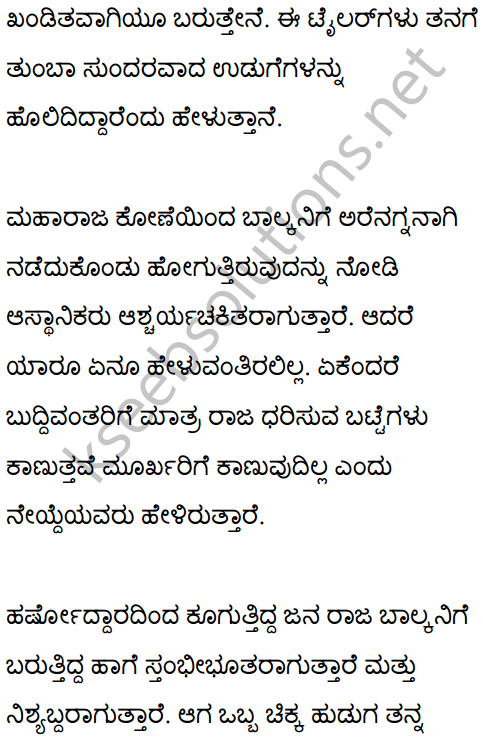
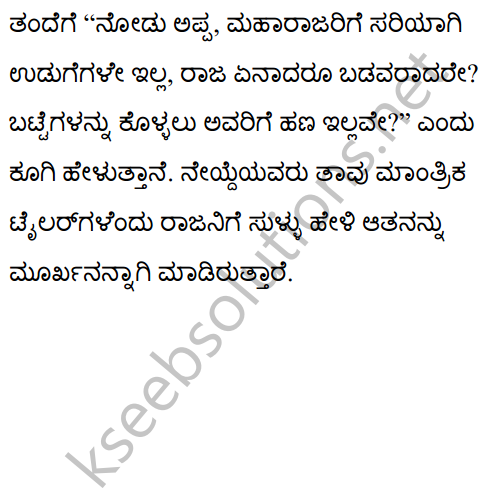
![]()
The Emperor’s New Clothes Lesson Word in English
- banish = Send someone away permanently from one’s country or area as an official punishment
- claim = To state that something is true even though it has not been proved yet.
- indeed = Used to emphasize a statement or answer, infact, really
- expect = Look forward, regard as likely
- pardon = Word used to say sorry
- discover = Find out something new
- flatter = Praise someone insincerely in order to get something for personal gain
- compliment = Words expressing praise
- affairs = Public or political events and activities
- excellent = extremely good
- puzzle = to confuse someone
- pattern = design
- jewels = valuable objects used for decoration
- progress = improve, Develop
- trace = find someone / something that has disappeared
- tack = to fasten piece of cloth together with long loose stitch before sewing
- a pair of trousers = Pants,
- nod = move one’s head up and down to say that one agrees
- rustle = noise produced when leaves, papers and clothes rub against one another
- naked = not wearing anything
- cheer = shout as a way of showing happiness
- procession = ceremonious train of persons
- magic = witchcraft
- weave = unite thread so as to form a cloth
- fool = simpleton
- heaven = place where god is believed to live
- good heavens = interjection used to express surprise.
- of course = used as a polite and friendly way of agreeing to something,
- fond of = like something / someone very much.
- pretend = Behave as if something is true, act.
- try out = A period of time spent trying a new method, tool, machine etc., to see if it is useful.
- suit = A set of clothes made of the same material.
- ‘your majesty’= Address used when talking to royalty.
- tone = The way your voice sounds which shows how you are feeling or what you mean.